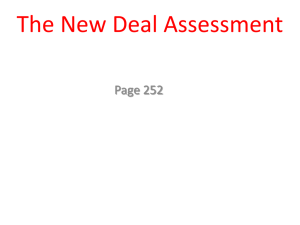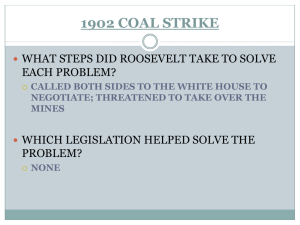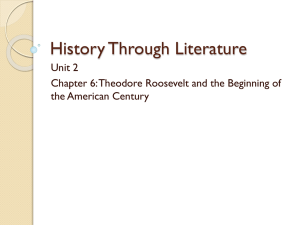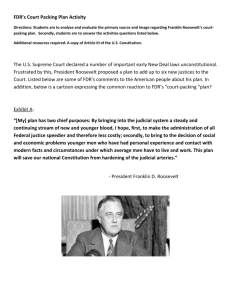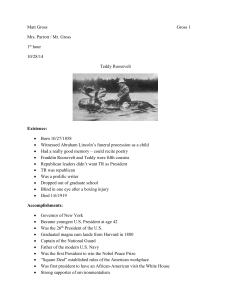File - Briana P. Adams
advertisement
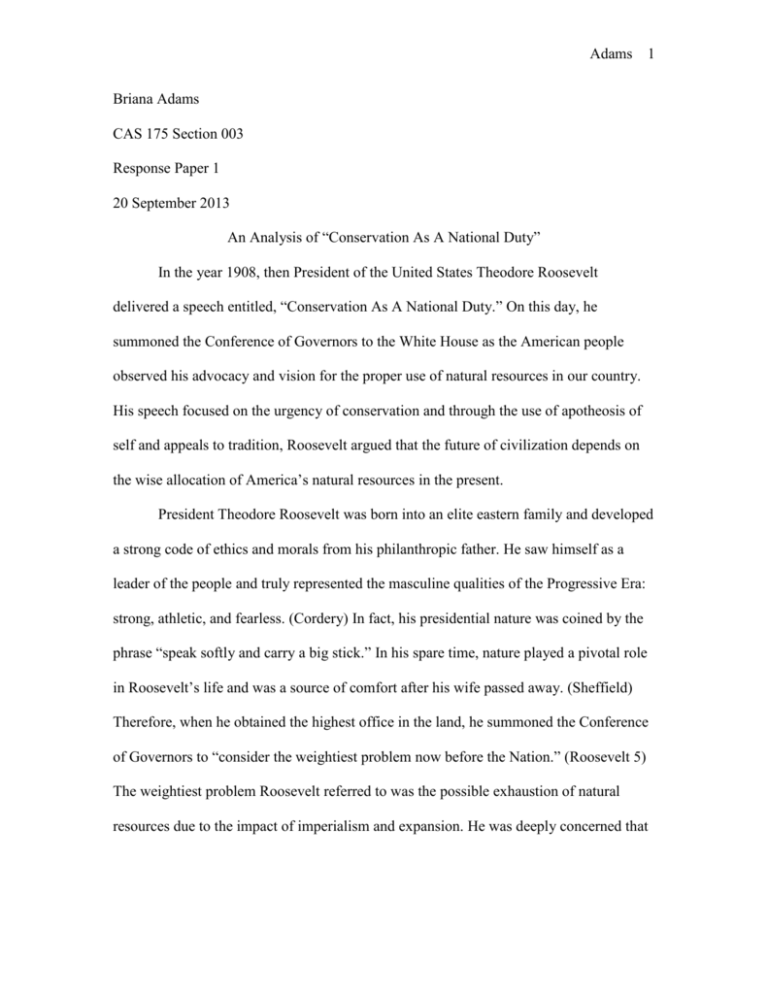
Adams 1 Briana Adams CAS 175 Section 003 Response Paper 1 20 September 2013 An Analysis of “Conservation As A National Duty” In the year 1908, then President of the United States Theodore Roosevelt delivered a speech entitled, “Conservation As A National Duty.” On this day, he summoned the Conference of Governors to the White House as the American people observed his advocacy and vision for the proper use of natural resources in our country. His speech focused on the urgency of conservation and through the use of apotheosis of self and appeals to tradition, Roosevelt argued that the future of civilization depends on the wise allocation of America’s natural resources in the present. President Theodore Roosevelt was born into an elite eastern family and developed a strong code of ethics and morals from his philanthropic father. He saw himself as a leader of the people and truly represented the masculine qualities of the Progressive Era: strong, athletic, and fearless. (Cordery) In fact, his presidential nature was coined by the phrase “speak softly and carry a big stick.” In his spare time, nature played a pivotal role in Roosevelt’s life and was a source of comfort after his wife passed away. (Sheffield) Therefore, when he obtained the highest office in the land, he summoned the Conference of Governors to “consider the weightiest problem now before the Nation.” (Roosevelt 5) The weightiest problem Roosevelt referred to was the possible exhaustion of natural resources due to the impact of imperialism and expansion. He was deeply concerned that Adams 2 if consumption trends continued at its present rate, that “dark will be the future” (Roosevelt 31) and that future generations would be at a severe disadvantage. Roosevelt opened his speech by declaring his purpose, which was to discuss the “question of conservation and use of the great fundamental sources of wealth of this Nation,” with state governors and the American people. (Roosevelt 2) As President of the United States, he used his ethos and platform to speak directly to the public. This coincided with the theme of this Progressive Era in America, which was to spread a clear, simple message to a wider audience. His audience reacted positively to his message. In fact, there were many sporadic moments of applause and laughter. According to Sheffield, the conference was so effective that thereafter, the “governors present[ed] a signed unanimous declaration supporting Roosevelt’s view of conservation” along with the creation of various conservation commissions. (Sheffield) One of the ways Roosevelt propagandized his speech was through the inundation of appeals to tradition and history. He makes strong connections to successful civilizations throughout history and the impact on the environment thereafter. Roosevelt suggests that, “with the rise of peoples from savagery to civilization…there comes a steadily increasing growth of the amount demanded by this average man from the actual resources of the country.” (Roosevelt 6) This populist technique helps to bridge the gap of education and knowledge between the Senators and Representatives in Congress, members of the Supreme Court, and the common man, who were all in attendance. In addition, he sets a premise for the current issue at hand. The rise of civilizations would be nearly impossible without abusing the environment to some extent. As pioneers and explorers began to discover and mark new land for their respective countries, thus began Adams 3 the slow degradation of natural resources. He mentioned the banks of the Nile and the Euphrates, as well as America during the late 1770’s, to demonstrate how far America has advanced and developed industrially throughout history. Roosevelt’s tone was understanding, and made it clear that the United States would not be at its industrial, economical, and political position without the use of natural resources. He argued that “our position in the world as been attained by the extent and thoroughness of the control we have achieved over nature” and that now it was the moral responsibility of Americans to conserve nature for generations to come. Roosevelt claimed that as a highly civilized people, Americans know more than early civilizations and forefathers did, and with this foresight, should apply it to the critical use of materials. Moreover, the exaggerated use of apotheosis of self was another technique Roosevelt used to inculcate this moral obligation of conservation into the 1908 Conference of Governors. He made constant references to America being a great nation and the levels to which it has developed compared to any other group or civilization. After doing so, he attributed this to the abundant resources that America possesses. Roosevelt asserts that, “Our position in the world has been attained by the extent and thoroughness of the control we have achieved over nature.” (Roosevelt 20) He did this to not only build up the esteem of his audience, but to associate this level of integrity and prestige with a moral responsibility to take action. He took one step further and referred to America as being supplied by Nature to a higher degree “than has ever been the case at any other time or with any other people.” (20) Roosevelt urged that the American people now owe Nature the proper respect it deserves before it is permanently depleted. Adams 4 Overall, Roosevelt effectively used the aforementioned populist techniques to persuade the American people and attendees of the 1908 Conference of Governors that it was their moral duty to control the trends of excessive consumption and move towards a more conservative attitude. He explained how the prestige and authority that the United States now possessed was due to the sacrifice and detriment of the environment. Therefore, it was then the responsibility of the United States to protect the resources it had been given. The public positively received his speech and applauded him throughout the speech, and he has gone down in history for advocating the creation of National Parks along with other environmental efforts. His theme for a conservative minded population still reigns triumphant today. With the recent theories of global warming and the danger that fossil fuels are imposing on society, the words and ideas from this 1908 progressive speech still remain relevant in 2013. Environmentalists and scientists are weary that one day we will exhaust our nonrenewable sources as Roosevelt warned in his speech. Perhaps Roosevelt is right, that it is time for such a civilized nation to allocate our resources wisely and find innovative ways to utilize our renewable sources before it is too late. Adams 5 Works Cited Encyclopedia of American Studies, ed. Simon J. Bronner (Baltimore: Johns Hopkins University Press, 2013), s.v. "Roosevelt, Theodore” (by Stacy A. Cordery), http://eas-ref.press.jhu.edu/view?aid=564 (accessed September 18, 2013). Sheffield, Jessica. THEODORE ROOSEVELT, "CONSERVATION AS A NATIONAL DUTY.” Voices of Democracy, 2011. Web. 18 Sept. 2013. Roosevelt, Theodore. Conservation as a National Duty. 1908. MS. Library of Congress, Washington, DC. Voices of Democracy. Web. 20 Sept. 2013.



